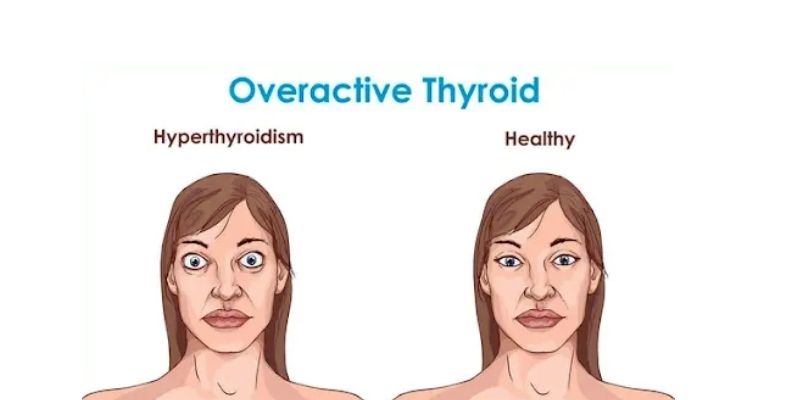Hyperthyroidism occurs when the thyroid gland produces excessive hormones. These hormones control metabolism and energy. Many people overlook symptoms, unaware they relate to thyroid function. Recognizing common signs of hyperthyroidism is essential for early diagnosis and care. Left untreated, it may cause serious issues like heart strain or bone weakness.
Fatigue, mood swings, and weight changes often go unnoticed. Identifying these early warning signs of hyperthyroidism helps in timely treatment. With proper medical care, you can manage symptoms and restore balance. Understanding how your body reacts to hormone imbalances improves your overall well-being. Paying attention to subtle changes can protect your health. Always take note of persistent signs and seek medical evaluation when concerns arise.

Unexplained Weight Loss and Increased Appetite
Unexpected weight loss can indicate a metabolic imbalance brought on by too high thyroid hormone levels. The body can quickly lose weight even on a healthy diet. Although appetite rises sometimes, the scale keeps declining. Many people would find this mix confusing. Early stages of hyperthyroidism show this typical symptom. The hyperactive thyroid increases metabolism above the usual range. The body so consumes calories at an exceptionally rapid speed.
One starts to eat often, and meals can seem less satisfying. Even with big meals, energy can still seem low. The thyroid could be the source of garments fitting looser abruptly without dieting. Many times, these symptoms cause nutritional deficits. One should not overlook constant eating without weight increase. Medical tests can precisely find hormone levels. Understanding these symptoms of hyperactive thyroid helps one avoid major medical problems. If you observe ongoing, inexplicable changes in weight and hunger patterns, always get help.
Rapid Heartbeat and Palpitations
A rapid heartbeat or fluttering in the chest often alarms people. Palpitations may occur even while resting or during sleep. The heart rate can exceed 100 beats per minute without any physical activity. Overactive thyroid hormones unduly activate the heart. The heart then beats stronger and faster. Usually accompanying these physical symptoms are emotions of anxiety. One could find skipped beats or irregular rhythms. Nightwise, palpitations can disrupt sleep and lead to tiredness. Some people would confuse this for anxiety problems or panic attacks.
Still, such symptoms are intimately associated with thyroid imbalance. In the long term, a constantly high pulse rate might tax the heart. Tracking your resting heart rate helps you find irregularities early on. See a doctor if a fast heartbeat starts to happen often. Usually presenting are classic early warning indications of hyperthyroidism. Don't dismiss ongoing alterations in your heart. By seeing these symptoms, one can avoid more damage and direct appropriate therapy before problems develop.

Nervousness, Anxiety, and Mood Changes
Physical abnormalities like hyperthyroidism often cause mental health issues. One could develop an ongoing sense of anxiety or agitation. Many people have anxiety without knowing exactly why. Little stresses can seem intolerable and difficult to control. Mood swings of sudden intensity become more common. Sadness or anger could show up without logic. The first thing observed by others around could be these emotional fluctuations. An overactive thyroid causes responses to stress hormones and adrenaline. Calm events so seem to be either highly exciting or distressing. Usually, sleep problems aggravate these emotions.
Constant mental activity might interfere with rest and compromise concentration. Sometimes, these symptoms of hyperactive thyroid are confused with anxiety problems. One must assess the physical causes of emotional shifts. Hormone testing enables fast clarity of the matter. Thyroid testing can help you find answers if you are consistently nervous or emotionally unstable. Don't overlook the link between mental health and bodily systems. With direction, mental suffering connected to common symptoms of hyperthyroidism can be successfully addressed.
Fatigue and Muscle Weakness
Even when sleep seems sufficient, hyperthyroidism often results in extreme tiredness. After waking, people could feel exhausted. Once simple tasks can be quite taxing. Additionally, muscle weakness is showing up, particularly in the thighs and upper arms. Even ascending stairs becomes challenging. Though they eat well, muscles lose tone and strength. An overactive thyroid function wastes energy far too fast. The body runs empty and feeble from this. Daily activities could feel more difficult. Exercise might make one weaker rather than stronger.
Many times, these symptoms are taken for aging or stress. Still, they show actual bodily changes brought on by an imbalance of hormones. With correct therapy and care, muscles can heal. Early identification of typical symptoms of hyperthyroidism speeds healing. Many times, doctors advise blood tests to monitor thyroid hormone levels. See thyroid examination if you feel weaker than usual or depleted. Control of hormones helps to recover strength and vitality, enhancing daily performance and well-being.
Heat Intolerance and Excessive Sweating
Feeling overheated all the time is more than a minor annoyance. It often signals thyroid overactivity and leads to heat intolerance. People may sweat excessively, even while resting in cool environments. Clothes can become damp without any physical activity. The overactive thyroid increases the body's core temperature. It results in constant warmth, even when others feel comfortable. There is hardly relief from fans or air conditioning. Rest causes sweating; moving aggravates it. These are not normal reactions, so one should not overlook them.
Many write them off as environmental reasons. Still, they call for underlying hormonal problems. Such symptoms lessen the ease of daily living. They influence social interactions and sleep over time. Typical symptoms of hyperthyroidism like these call for medical examination. Blood testing helps to confirm the thyroid's involvement. Treatments abound to bring about proper body temperature control. Thyroid function could be the cause if you are always warm while others feel normal.
Changes in Menstrual Patterns and Fertility Issues
Reproductive ability depends much on the condition of the thyroid. Either irregular or smaller periods could point to an issue. Others may have missed cycles. These alterations throw off hormones and fertility. Menstrual periods either become erratic or shorter. One can thus get fertility problems.
Sometimes, these symptoms are misinterpreted as those of another disorder. Still, they fit quite closely to hyperthyroid activity. If cycle fluctuations continue, it is advisable to check thyroid activity. Reproductive health depends on hormones in balance. Early identification of hyperactive thyroid symptoms helps outcomes. Many times, medical treatment helps bring normal cycles back. Ignorance about abrupt changes in menstruation frequency or flow is unacceptable. They could indicate more than just a brief imbalance. Taking care of thyroid health will help to restore reproductive equilibrium and ease related problems.
Conclusion :
Recognizing early warning signs of hyperthyroidism is essential to prevent serious health issues. Symptoms of overactive thyroid often affect mood, energy, weight, and heart function. Don't ignore unusual fatigue, weight changes, or emotional instability. With proper testing and treatment, hormone levels can return to balance. A correct diagnosis can restore well-being and prevent complications. If signs persist, consult a healthcare provider to evaluate your thyroid health. Stay informed, act early to ensure better outcomes, and manage your condition with confidence and care.












